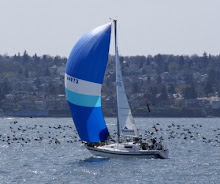While at work today, I took the time to check on the long range weather forecast. If there's something that is common through the rest of the month, that's rain. So like the last post, it's rain, rain and more rain. As depressing as all this sounds, all is not lost. As the temperature drops toward the end of the month, it's likely the rain will stop and we may see some more sunshine but also some snow. The latter is good for the skiers who are starting to get some in the mountains.
This morning we had a bit of a tease. There was a large area of clear, more or less cloudless sky overhead in Vancouver but that didn't last by late morning all that was replaced by a dark cloud cover and ice pellets for a time soon replaced by rain. The clear spot in the sky had moved east toward Metrotown while all around this opening, dark clouds could be seen and white pellets dropping down from them.
As I write, it's raining rather steadily with no sign of letting up. The long range forecast has rain everyday with the possibility of some sun next Tuesday but we all know that can change long before then. But when the sun does appear, people will be out in droves as is normal in these parts, especially after long periods of dark, gloomy weather.
While on the subject of the weather, I was checking out the status of the current climate change we are going through on a global scale. The Greenland icecap is melting at an alarming rate adding the equivalent of 0.75 mm (0.03 inch) to the world sea level each year for the period from 2006-2008, which is up from the period 2000-2008 when it was at a rate of 0.46 mm. This information was in a report authored by Michiel van den Broeke, of Utrecht University. The report was contained in a study published in the journal Science.
Not only is the Greenland icecap melting but there are great changes in other areas of the Arctic, such as the sea ice in the Arctic Ocean. The same goes for the Antarctic in the southern part of the globe. I'll present more on this subject on my companion blog, Haliaeetus, but this will have to wait until atleast the weekend when more time is available.
Meantime, remember, changes are not all bad news but also present new possibilities, new challenges, new scenarios for learning about the globe, how weather works and our effects on the entire weather system. We don't life in isolation, so our industrialisation has had to have changed the weather patterns to a great extent over the last few hundred years. How much this has contributed to a natural cycle we will soon find out as the world temperatures go up and ocean levels rise! - V.
PotD : Brandon Evans
-
PotD_2238_Falcon_"Code of Silence" 2017 : Brandon Evans sucks Sean Zevran
3 hours ago

























m.jpeg)



-3.jpg)














No comments:
Post a Comment